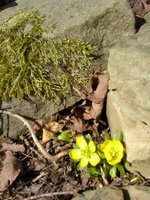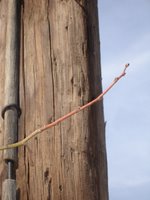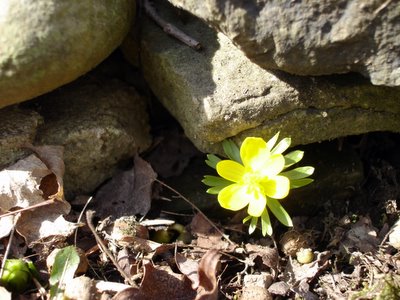The created world can be both reliable and surprising.
 I've just finished having my afternoon possessed by Kathryn Davis's The Thin Place, which is well-nigh undescribable. More than anything else, I suspect I'd call it a thinking book. It discovers strange life everywhere; like the world (as described in the title of today's post, a line which occurs about two-thirds of the way through the novel), it unfolds in images and sensations to which one becomes swiftly and yet somehow never certainly acclimated. Any novel that relies as much as this one does on Julian of Norwich is, I suppose, bound to seem simultaneously beautifully inviting and unutterably, unplaceably foreign. Rather than try to build a structure of my own words around the novel, though, I'm going to offer you a few of the stones I collected as I made my way through Davis's pages. For the most part, these bits are non-narrative, because the non-narrative bits are the ones that announce their unexpectedness most strikingly (and also won't ruin the plot, should you follow my lead and pick this one up):
I've just finished having my afternoon possessed by Kathryn Davis's The Thin Place, which is well-nigh undescribable. More than anything else, I suspect I'd call it a thinking book. It discovers strange life everywhere; like the world (as described in the title of today's post, a line which occurs about two-thirds of the way through the novel), it unfolds in images and sensations to which one becomes swiftly and yet somehow never certainly acclimated. Any novel that relies as much as this one does on Julian of Norwich is, I suppose, bound to seem simultaneously beautifully inviting and unutterably, unplaceably foreign. Rather than try to build a structure of my own words around the novel, though, I'm going to offer you a few of the stones I collected as I made my way through Davis's pages. For the most part, these bits are non-narrative, because the non-narrative bits are the ones that announce their unexpectedness most strikingly (and also won't ruin the plot, should you follow my lead and pick this one up):In the beginning it was beautiful.... It was beautiful and it could have stayed that way, but Nothing reached its beautiful endless hand-that-is-not-a-hand into the infinite Nothing of itself and turned itself inside out, giving itself form. The hand of God, which has no shape, no up or down, no end or beginning, drew the world from itself like a rabbit from a hat.It's the passage about lichen that stuck with me all day, fastened tight to me like the stuff itself. Our weather kissed 60 degrees yet again; a student met with me wearing a miniskirt and t-shirt and didn't look one bit cold. Even I threw the winter coat over for my leather jacket, its lining pulled away from its bottom seam, leaving the unparalleled soft of the leather's underside readily reachable on an already overstimulating walk home for lunch.
Lichen speaks a language like some music, repetitive and incantatory: manna star fold star. star star fold reindeer. fold fold fold fold. starlight starlight.... So many things are alive: lichen, moss, grass. Also people. So many things are alive and that's what's strange, not that things like stones aren't, especially when you consider how everything's made from the same materials.
Life has nowhere to move, being everywhere, doesn't move though it's always in motion, is the leaf is the trash is the girl's pierced navel the worm the cat's paw the lengthening shadows.
When Thomas thrust his hand into Jesus' side, what he really wanted to feel was his own flesh and marrow. That's curiosity: the wish to know exactly what we're made of and to determine how fragile we are, or mortal, or even--clinging to that most romantic version of hope that's nothing more than wishful thinking--immortal.
The sea was calm, the sun shining. An iceberg drifted past to the east, the sunlight turning it to a world that seemed not only possible but also irresistible to enter, a shade of aquamarine verging on no color at all, crystal clear, like heaven. In the water, capelin and seals. In the air, razorbills and gannets.
 Who knew that some trees' new spring growth comes in red, marking the break between last year and this? I would like this image not to have so much of a utility pole in its background, but at least you can see what I saw, which in this case is more important to me than the quality of the shot. The whole way home, I double-checked the trees and the bushes I've been watching since January: the newest shoots, the nascent leaves, the shaping berries. Everything is turning scraggly, heedlessly throwing out and up and beyond. I continue to fear these growths will turn out to be flails, prematurities--that something is creepily, grimly slouching around some dark corner we'll push up against when March roars in, if not sooner.
Who knew that some trees' new spring growth comes in red, marking the break between last year and this? I would like this image not to have so much of a utility pole in its background, but at least you can see what I saw, which in this case is more important to me than the quality of the shot. The whole way home, I double-checked the trees and the bushes I've been watching since January: the newest shoots, the nascent leaves, the shaping berries. Everything is turning scraggly, heedlessly throwing out and up and beyond. I continue to fear these growths will turn out to be flails, prematurities--that something is creepily, grimly slouching around some dark corner we'll push up against when March roars in, if not sooner.And perhaps that's the most interesting thing about Davis's novel, to my mind: its theology--for theology it undoubtedly is, replete with struggles between good and evil, unexpected angels and unmistakeable fiends, even if you walk in forty pages without fully getting what you're getting, as I did--posits the fiercest and most remorseless of devourings, consumptions, needs, and fears, casts them relentlessly as chances and accidents and indifferences that are obviously patterned and willed, though in what order or for what purpose she rarely, if ever, has the arrogance to presume to know. And yet, in a novel where people get stabbed, have car accidents, and drown, where small animals are trapped, eaten, or heart-broken, the overriding feel of it all is fiercely, hopefully resolute:
Consider the souls of the extinct creatures.The rush of the central paragraph here--the hurtle, the push, the not-knowing, the curiosity--somehow makes the imperative (Consider) and the final interrogative (Would there?) both less final, less conclusive than they might otherwise have been. And much of The Thin Place works just this way. There's an unsparingness, a refusal (if not an utter inability) to flinch, steeling some of Davis's lines: "One being sacrificed to make to make way for another." (Be sure you read "being" as a noun, as the thing that is sacrificed, not as part of the verbal phrase "being sacrificed.")
Suppose there are many universes, each one called into being at the slightest touch, an action no stronger than a flower? Suppose our galaxy and all the others, instead of drifting more and more slowly, reluctantly even, away from one another, with heavy hearts and a lingering backward glance, are instead speeding up, as if the process isn't a long drawn-out endgame but an excited rush toward something? As if the end itself could be the exciting goal, even if that something is the complete extinction of space and time?
Would there be anything left over?
My favorite line from one of my favorite poems, Elizabeth Barrett Browning's verse-novel Aurora Leigh, is almost ridiculously simple: "Never flinch." I once organized the whole first page of a take-home exam so that that part-line would obtrude itself into my students' gaze right away and, ideally, would not let up until they'd taken it into themselves, even if they weren't aware of it. Something about reading Davis both early and late today is giving me a different (though still potentially pathetically fallacious) way to read the resolute springing of my landscape. The yellow flowers in my yard don't have the agency to stop or start their growth; the signals come, and they grow. The noon sun hits them, and they open. If I were to flash-photo them when I reached home in a little while, my images would be differently washed out than this last one you'll get from me tonight, but the center of their overexposure would be tightly closed buds, perhaps turned back, ever so slightly, to whatever vestige of warmth these stones may have caught and then started releasing over the course of the day. They may well get cut down when the next cold shudders in tomorrow evening--the high wind advisories are posted already--but then again, they might not. They've made it through one snow already, after all. And if they do die early, there won't necessarily be a legible reason or bigger meaning behind their being sacrificed--but now, due to Davis, I'm wondering whether something else might not have to be making its way in to take their place.



0 Comments:
Post a Comment
<< Home